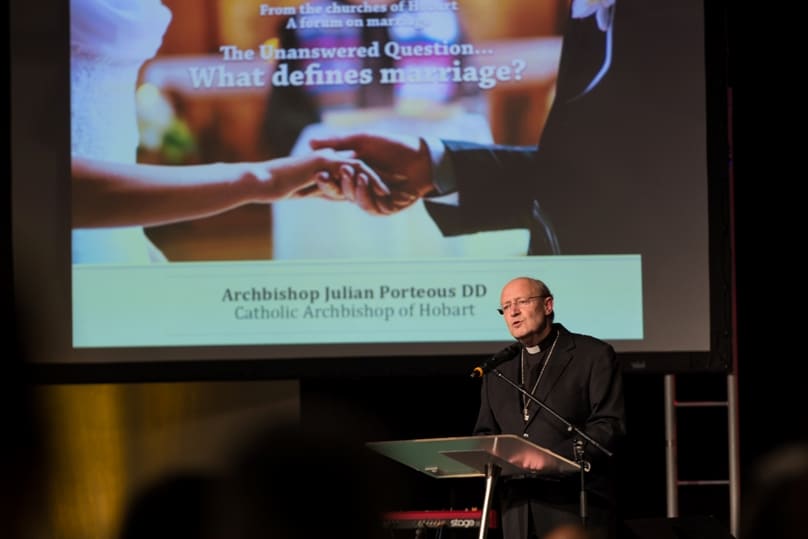
In what can only be described as “the world’s most predictable leak”, the recommendations from the Expert Panel on Religious Freedom – or the ‘Ruddock review’ – were leaked to Fairfax media last week, well ahead of their intended release by the Prime Minister.
It happened in carefully orchestrated stages.
First, a chorus of voices began calling for its release; notably those who were deeply embedded within the ‘yes’ campaign for the marriage plebiscite. I wrote about those incidents a few weeks ago.
Next, a single recommendation was provided to Fairfax media. Not any recommendation, but the recommendation chosen to cause the most controversy. And – for maximum effect – only part of the recommendation was reported, without any context or commentary from the Expert Panel. It was reported that the Expert Panel recommended that the Sex Discrimination Act be amended so that religious schools should be able to discriminate in relation to students on the basis of sexual orientation, gender identity or relationship status.
This is pretty provocative stuff, but even more provocative when described by LGBTI activists as giving religious schools the ability to expel gay kids. This outrage was step three in the process of attacking the credibility of the Expert Panel’s review.
Amidst all the hand-wringing, the remainder of the recommendations were leaked, again to Fairfax media, guaranteeing that when parliament began sitting again, it would be preoccupied with defending gay kids against these evil religious schools just looking for a reason to expel them.

This would be terrible… if it bore even a remote resemblance to the purpose of the recommendation, and to what is actually going on in schools.
Surprise, surprise: it’s not. Here’s what is actually happening. The Sex Discrimination Act already allows religious schools to discriminate against students on the basis of sexual orientation, gender identity and marital status if it is done “in good faith in order to avoid injury to the religious susceptibilities of adherents of that religion or creed,” or in other words, to avoid scandal.
The Expert Panel determined that this was not sufficient grounds for discrimination, and recommended that – in addition to avoiding scandal – the school has a publicly available policy outlining its position in relation to the matter, provides a written copy of the policy to existing and prospective students and their parents, and holds the best interests of the child as the primary consideration in its conduct.
In other words, the Expert Panel recommended tightening the existing protections for religious schools.
This didn’t stop the activists so falsely characterising the recommendation as to make it look like the Expert Panel recommending the expulsion of gay kids. The false description was not an accident: they were looking for an opportunity to undermine the Expert Panel and – consequently – undermine the protection of religious freedom in this country.
And it seems to have had the desired effect. Instead of making the first legislative action coming out of the Expert Panel’s review being one that provides additional protections for religious freedom, it appears likely that the first legislative action will be to take them away.
And this is a protection that we should not give away lightly. Not because Catholic schools want to expel gay kids. I know of no school that has and no school that would. The Church upholds the dignity of every human person, including those with same-sex attraction, and would seek to handle any situation like this with sensitivity and compassion.
So, why do we need the exemption?
There are many scenarios that didn’t involve expelling a gay student that could still be argued to be discriminating against a student on the basis of sexual orientation or gender identity. For example, this exemption is the reason that, currently, single-sex Catholic schools are permitted to enrol students based on biological sex. A removal of the “right to discriminate” in the Sex Discrimination Act would put into doubt whether an all-girls school would be forced to enrol a biological boy who identified as a girl.

In co-educational Catholic schools, the “right to discriminate” allows policies relating to school uniforms, bathrooms, and participation in school sports or other activities, including overnight camps, to be based on biological sex. Remove this, and a Catholic school would have no right to object to a male student showing up in a dress, sleep in a girl’s cabin on school camps, use the girls’ toilets or participate in all-girls sporting teams.
Additionally, an activist could, and likely would, claim that a Catholic school would be “discriminating” on the basis of sexual orientation if it insisted teaching a Catholic understanding of marriage, or limited its sex education to heterosexual sex. Canadian courts have already invented a “right” for students to see their own family structures included in their education about marriage and sexuality, and there is no reason why it couldn’t happen here.
In fact, the seeds have already been sown. You will recall the case of Archbishop Julian Porteous being told he had a case to answer before the Tasmanian Anti-Discrimination Commission for distributing a pastoral letter about Catholic teaching on marriage.
There are many ways that the removal of this exemption will be used to drive social changes through our Catholic schools, and none of these have anything to do with expelling gay students. That’s why we have to call out the false characterisation of these protections for what it is, and stand up for our right to religious freedom.
